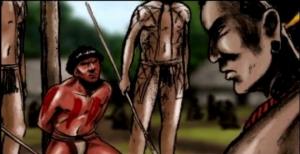Meaning of Man is good by nature
What is Man is good by nature:
The phrase "man is good by nature" is a statement authored by the eminent writer and intellectual of the Enlightenment period Jean-Jacques Rousseau in his novel Emilio or of the education, published in 1762.
In this novel, where Rousseau exposes his theories of education that would later influence the development of modern pedagogy, it is explained that the human being is naturally oriented towards the good, since man is born good and freeBut traditional education oppresses and destroys that nature and society ends up corrupting it.
Let us also remember that Rousseau relied on the good savage thesis, according to which the human being, in his natural, original and primitive state, is good and candid, but the social and cultural life, with its evils and vices, pervert it, leading to physical disorder and moral. Hence, he considered that man in his primitive state was morally superior to civilized man.
However, this claim that man was good by nature was opposed to another idea, diametrically opposed, wielded the previous century, at the time of the birth of the States national, by Thomas Hobbes, according to which man, on the other hand, was bad by nature, since he always privileges his own good above that of others, and, in a wild state, he lives in the midst of continuous confrontations and conspiracies, committing cruelty and violent acts to ensure the survival.
Hobbes, then, argued that man was a predator, "a wolf to man," and that the only way out of that primitive state was to build a national state, with a centralized political power, of an absolutist and monarchical court, that would allow man to group together to survive, going from that wild lifestyle to one of order and moral, superior and civilized.
See also Man is a wolf to man.
However, it has been criticized the claim that goodness or, failing that, badness, can be natural, since from a moral point of view neither goodness nor badness are natural properties. Goodness and evil, good and evil, are moral categories that have their roots in Judeo-Christian religious thought, according to which human beings are created by God in the image and likeness of him, and therefore good by nature, in the likeness divine. So to say that man is good or bad by nature is to moralize nature.
Rather, it could be argued that the human being is not born good or bad, since in the earliest stages of his development the individual is devoid of cultural references, information or experiences, which endow him with good intentions or purposes or bad.
On the other hand, a Marxist interpretation of Rousseau's phrase, I would readapt its content to explain that man, who is essentially a social being, depends on the set of social relations that establishes with others, in reality it is corrupted by capitalist society, whose system, erected on the exploitation of man by man, and where each individual he must fight fiercely to maintain his privileges and possessions, he is fundamentally selfish, individualistic and unjust, and contrary to the social nature of being human.
In conclusion, the phrase "man is good by nature", rooted in a system of thought typical of the Enlightenment and in a historical context in which European man was in a phase of moral revision in relation to his way of seeing and understanding non-European man (American, African, Asian, etc.), in living conditions comparatively primitive, he had a certain suspicion towards the moral purity of civilized man, seen fundamentally as the product of a society corrupted by vices and absence of virtue. It is, therefore, an idealized vision of man in his original state.
See also Man is social by nature.
About Jean-Jacques Rousseau
Jean-Jacques Rousseau was born in Geneva in 1712. He was an influential writer, philosopher, botanist, naturalist, and musician of his day. He is considered one of the great thinkers of the Enlightenment. His ideas influenced the French Revolution, the development of republican theories, the development of pedagogy, and he is considered a precursor of romanticism. Among his most important works are The social contract (1762), the novels Julia or the new Heloise (1761), Emilio or of the education (1762) and his memoirs Confessions (1770). He died in Ermenonville, France, in 1778.


